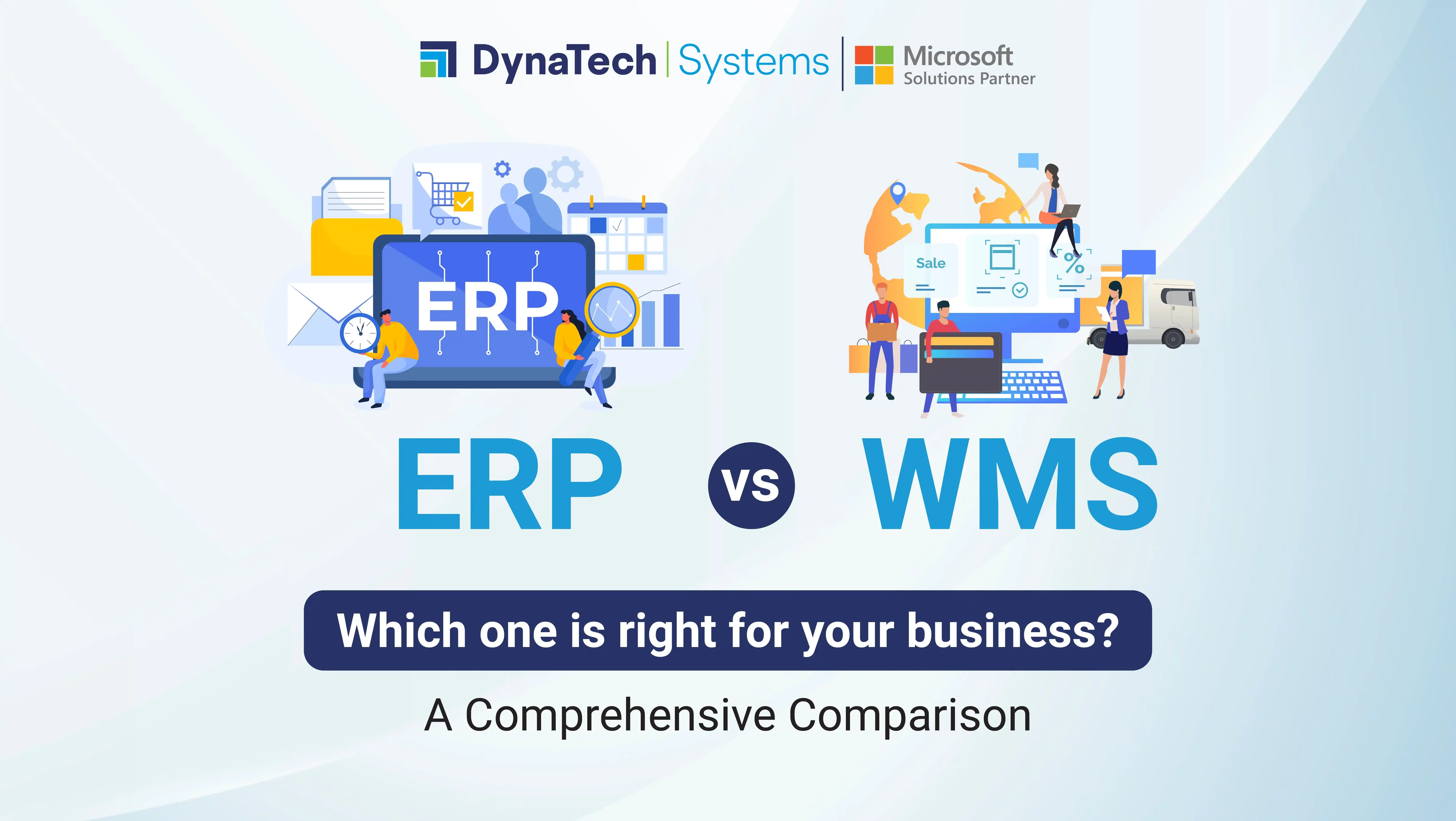In the manufacturing sector, which has its own share of challenges and bottlenecks, choosing the right software systems to streamline processes and mitigate risks is vital. Today, in the technology-savvy era, businesses struggle to keep pace with the competition. With the right software at their disposal, they can gain a competitive advantage and drive growth, transparency within the system, and ROI.
Warehouse Management Systems (WMS) and Enterprise Resource Planning (ERP) systems are two software applications that manufacturing businesses use. ERP and WMS ensure streamlined procurement, better inventory management, and data-driven decisions.
However, manufacturers sometimes get confused about selecting the right software for their businesses. Both ERP and WMS systems have their own complexities and benefits, and businesses must consider their end goals, system vulnerabilities, and other business aspects before choosing the right software for their business.
This post discusses ERP and WMS systems, their features, functionalities, key differences, and suggestions for choosing the right software for your business.
What is an ERP system?
Do you want to build a centralized, unified, and versatile dashboard that allows you to manage all your business operations within the organization? An ERP system can make this happen for you. It is an inclusive suite of various applications designed to streamline your processes by integrating various business operations, such as accounting, supply chain management, human resources, customer relationship management, and others, into a single and unified system.
The main objective of implementing an ERP system is to ensure that all stakeholders have easy access to critical data and information, enabling them to collaborate seamlessly and make data-driven decisions.
Benefits of an ERP System
- Improved Data Accuracy and Consistency: An ERP system centralizes data received from various sources and offers easy access to all the stakeholders. It reduces data inaccuracies and fosters smooth communication across departments. It ensures that all departments work with the same data, ensuring consistency.
- Efficient Operations: If you want to improve operational efficiency across all departments, an ERP system can come to your rescue. Employees can focus more on meaningful and strategic activities by automating mundane, repetitive tasks. Also, such automation quickens various processes as well.
- Better Decision-Making: An ERP system offers real-time data to make informed decisions. With advanced analytics and reporting tools, it provides highly actionable insights for businesses to work with.
- Scalability: Businesses can scale their ERP systems with new departments, activities, processes, and integrations with other systems.
- Regulatory Compliance: Modern, advanced ERP systems, such as Dynamics 365, are designed to comply with different data regulations.
- Better Customer Experiences: Furthermore, an ERP system helps businesses to offer fruitful and satisfying customer experiences. Today's modern ERP systems also leverage the potential of cutting-edge technologies, such as Artificial Intelligence, Machine Learning, IoT, and others, to drive efficiency, data-driven decision-making, and business growth. It is like the backbone of any business to streamline processes and automate operations while offering quick data access to stakeholders.
What is a WMS?
A Warehouse Management System (WMS) is dedicated, scalable, and comprehensive software designed to optimize warehouse operations. The main goal of implementing a WMS is to manage, monitor, control, and store raw materials and manage other processes, such as shipping, receiving, picking, etc. A WMS plays a crucial role in ensuring smooth and efficient warehouse operations while optimizing inventory, purchasing, and logistics operations.
Some benefits of a WMS
- Improved Inventory Management: One of the most significant benefits of a WMS is improved inventory management. Businesses can mitigate risks by producing real-time data on inventory movements, levels, and locations, such as overstocking and stockouts. Also, modern WMSs have automated data entry with barcode/RFID scanning features to minimize errors and discrepancies.
- Optimized Picking and Packing: Another benefit of a WMS is highly accurate and streamlined picking and packing, with features such as batch picking, wave picking, and optimized picking paths. These features increase overall efficiency and reduce order fulfillment time.
- Better Space Utilization: A WMS also helps companies design an optimized warehouse layout to maximize space and reduce unnecessary inventory movements. The system allows businesses to choose the best locations for slotting and re-slotting based on demand patterns and size.
- Cost Reduction: Businesses can reduce their operational costs by automating tasks such as inventory tracking, picking, etc. Accurate inventory management can also mitigate overstocking incidences.
- Improved Supply Chain Visibility: Businesses can also integrate WMS with other existing systems, such as ERP and TMS, to gain full supply chain visibility and improve overall coordination. Managers can easily and accurately track products throughout the supply chain for a better course of action.
- Better Supplier and Customer Relationships: Implementing a WMS system can improve businesses' relationships with suppliers and customers. Timely replenishment and reduced lead times will also improve a brand's reputation and trustworthiness.
Difference Between WMS and ERP Systems
When you compare ERP Vs. WMS, there are some striking differences that you must learn. These differences will help you choose the right software for your business. We have discussed some of them here.
|
Particulars |
WMS |
ERP |
|
Primary Focus |
The primary focus of a WMS system is to enhance the efficiency and productivity of warehouse operations with streamlined processes, such as inventory management, shipping, tracking, space utilization, etc. |
The primary focus of an ERP system is to streamline various business operations and processes, such as finance, SCM, customer relationships, etc. The main goal here is to integrate all these processes to have a better and clear data visibility and streamlined operations to improve efficiency and drive growth. |
|
Functionality |
Inventory management, shipping, optimum space utilization, picking and packing, labor management, receiving, etc. |
Accounting, human resources, procurement, supply chain management, customer relationship management, finance, etc.
|
|
Specialized Features |
Advanced warehouse layout design, cross-docking capabilities, better space utilization, stocking location priorities |
Invoicing, order management, accounting and finance management, purchase order management, ecommerce integration |
|
Implementation Complexity |
Quick implementation and deployment compared to ERP systems, which are complex to implement. |
As it affects multiple departments and operations, it is complex in nature and takes more time and effort to implement and deploy. |
|
Customization and Flexibility |
Highly customizable restricted to warehouse operations, with advanced features for better inventory management and superior efficiency. |
An ERP system is also a highly customizable system that can be configured as per your business requirements. Sometimes, it becomes very challenging to manage. |
|
Data Management |
A WMS system focuses more on real-time data within the warehouse to manage inventory, shipping, packing, order management, and other warehouse operations. |
Excellent data consistency across various departments to ensure smooth collaboration among stakeholders. |
|
Reporting & Analytics |
You can have detailed analytics on warehouse processes and operations to optimize them to achieve warehouse management objectives. |
Sophisticated and comprehensive reporting and analytics capabilities to have accurate and highly actionable insights for strategic decision-making. |
|
Cost |
If you implement a WMS as a standalone system, it will cost less compared to advanced ERP systems. |
An ERP system costs more as it is a complex system with various integrations and configurations, affecting various business operations and departments. |
|
User Base |
It is used mostly by warehouse managers, inventory controllers, etc. |
Used by managers across all business departments, from finance to HR, supply chain, inventory, marketing, etc. |
|
Data Centralization |
Limited to warehouse operations |
Yes, across all departments. |
What Is an ERP Warehouse Management System?
An ERP warehouse management system is a separate module within an ERP system that focuses on improving the efficiency and accuracy of various warehouse operations and processes. Today, thanks to cutting-edge technologies, businesses can have an ERP system with an in-built WMS.
An ERP warehouse system smartly integrates a warehouse management system with other business processes, such as accounting, finance, HR, supply chain, and sales. An ERP system with an in-built WMS helps businesses manage orders, better receive and put away, pick and pack, shipping management, labor management, barcode and RFID integration, reporting and analytics, and integration with other existing ERP modules.
The main benefit of implementing an ERP system with an in-built WMS is that you can save significantly by not purchasing a separate system for warehouse management. You can have real-time data to make strategic decisions while improving the efficiency and productivity of your warehouse operations.
Which is Good for Your Business? ERP or WMS
This question has no specific answer, as it solely depends on your business needs and future goals. Determine your business challenges, requirements, and future goals and evaluate how these systems will benefit and fulfill your needs.
When to Choose a WMS system?
- If you have complex warehouse operations and you find it difficult to manage them
- For large enterprises with complex and specific business requirements,
- If you have budget constraints
When to Choose an ERP System?
- When you need scalability to expand your business in the future
- When you want to integrate your existing ERP systems with the new software.
- When you want smooth collaboration across all departments with a centralized database.
- If you are a small or mid-size enterprise with limited warehouse operations.
Conclusion
Both ERP and WMS systems have their own pros and cons. Choosing the right software for your business requires a clear understanding of your requirements, future scalability goals, cost, and other parameters. For integrated business process management, you can choose an ERP system. On the other hand, if you want to focus on improved warehouse operations, you can go for a WMS. Make your technological investment wisely to ensure superior ROI while driving growth and addressing your business challenges.




























